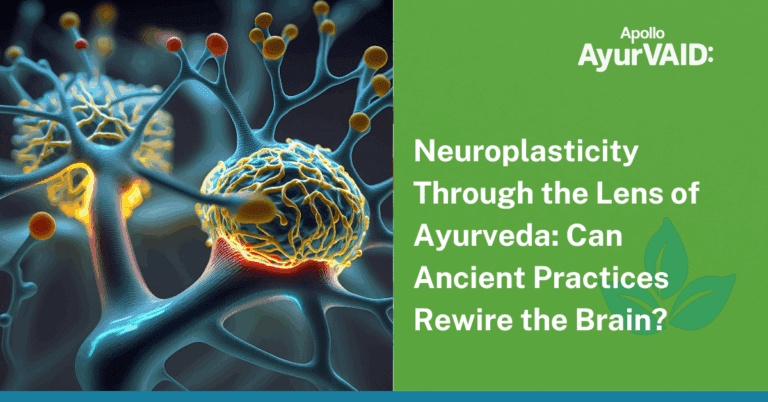Introduction
Parkinson’s disease, or Kampavata is a neurodegenerative disease presenting itself with certain motor symptoms like rigidity, stiffness, tremors, problems with balance and gait. There is no cure for it; conventional treatments try to reduce Parkinson’s disease symptoms. The following blog post discusses in detail Parkinson’s disease and also spotlights the holistic and evidence-based approach Ayurveda takes for Parkinson’s disease through personalized care. This blog post hopes to shed light on the Ayurveda perspective on navigating a complex neurological disorder.

What causes Parkinson’s Disease?
Falling levels of Dopamine, a neurotransmitter that controls movement and coordination is the reason for the development of Parkinson’s disease. Low norepinephrine levels due to damage of nerve endings are also an important factor in development of Parkinson’s disease.
Difference Between Parkinson’s Disease and Parkinsonism
While both conditions share similar symptoms such as tremors, muscle stiffness, and impaired balance, they have distinct differences that set them apart. Parkinson’s Disease is a specific neurological disorder caused by the loss of dopamine-producing brain cells, while Parkinsonism is a general term used to describe a group of neurological disorders that cause symptoms similar to Parkinson’s Disease but have different underlying causes. Multiple system atrophy or Corticobasal degeneration along with Parkinson’s disease fall under the umbrella term of Parkinsonism. Some of the symptoms of Parkinsonism might also go away with time.

Who does it affect?
- Age- People above 60 years of age are more likely to develop Parkinson’s disease
- History of head trauma
- Genetics
- Exposure to toxins
- Idiopathic- no known reason
Signs and Symptoms of Parkinson's Disease
Motor Symptoms-
- Tremors
- Slowness of movements (Bradykinesia)
- Stiffness of muscles
- Trouble writing and speaking
- Poor posture, balance and coordination with increased incidence of falls
- Changes in automatic movements like blinking of eyes, swinging arms while walking
Non-Motor Symptoms-
- Emotional changes and depression
- Fatigue
- Loss of sense of smell
- Constipation and urinary issues
Stages of Parkinson’s Disease
There are five stages of Parkinson’s disease-
- Stage 1- Tremors that are limited to one side of the body and do not interfere with daily tasks
- Stage 2- Tremors seen on both sides of the body, stiffness increases with changes in posture and facial expressions. Speech might start getting affected
- Stage 3- Symptoms of stage 2 become more prominent along with loss of balance and decreased reflex
- Stage 4- Significant reduction in reflex, inability to stand without assistance
- Stage 5- Need round the clock assistance, wheelchair to move around and increased chance of developing dementia
AyurVAID Approach to Parkinson’s Disease
Apollo AyurVAID utilizes evidence-based treatment focused on addressing the underlying causes of Parkinson’s Disease, leading to a reduction in tremors and balance issues. Our specialized root cause approach is adept at managing Parkinson’s Disease in conjunction with co-existing conditions like diabetes, Lewy body dementia, corticobasal degeneration, and multiple system atrophy. By adopting our proactive strategy, progression of the disease can be delayed and complications from prolonged medication use, such as Levodopa-induced dyskinesias and motor fluctuations, can be mitigated. Our comprehensive approach extends to Atypical Parkinsonism, integrating evidence-based Ayurveda with mainstream medicine across all facets of prevention, treatment, and rehabilitation. AyurVAID’s treatment for Parkinson’s Disease ensures sustained relief from the four cardinal signs of Parkinson’s disease- Tremor, Rigidity, Akinesia and Postural disturbances (TRAP) while preventing further advancement of the condition. Our protocol incorporates Ayurveda Panchakarma therapies designed to rebalance Vata dosha, commencing with Purvakarma to prepare the body, followed by Pradhanakarma to address the root cause, and concluding with Paschat Karma to restore motor function and stall disease progression. AyurVAID’s Precision Ayurveda offers exceptional results in managing Parkinson’s Disease, especially in conjunction with comorbidities like diabetes.
Conclusion
Parkinson’s disease is a complex neurological disorder characterized by a range of motor and non-motor symptoms, with no known cure in conventional medicine. However, Ayurveda offers a holistic and evidence-based approach to managing Parkinson’s disease through personalized care that targets the root causes of the condition. By focusing on rebalancing Vata dosha, AyurVAID provides a comprehensive treatment protocol that aims to reduce tremors, improve balance, and delay disease progression. With a proactive strategy that integrates Ayurveda with mainstream medicine, AyurVAID’s Precision Ayurveda has shown promising results in managing Parkinson’s Disease and its associated comorbidities, offering sustained relief and improved quality of life for patients.






